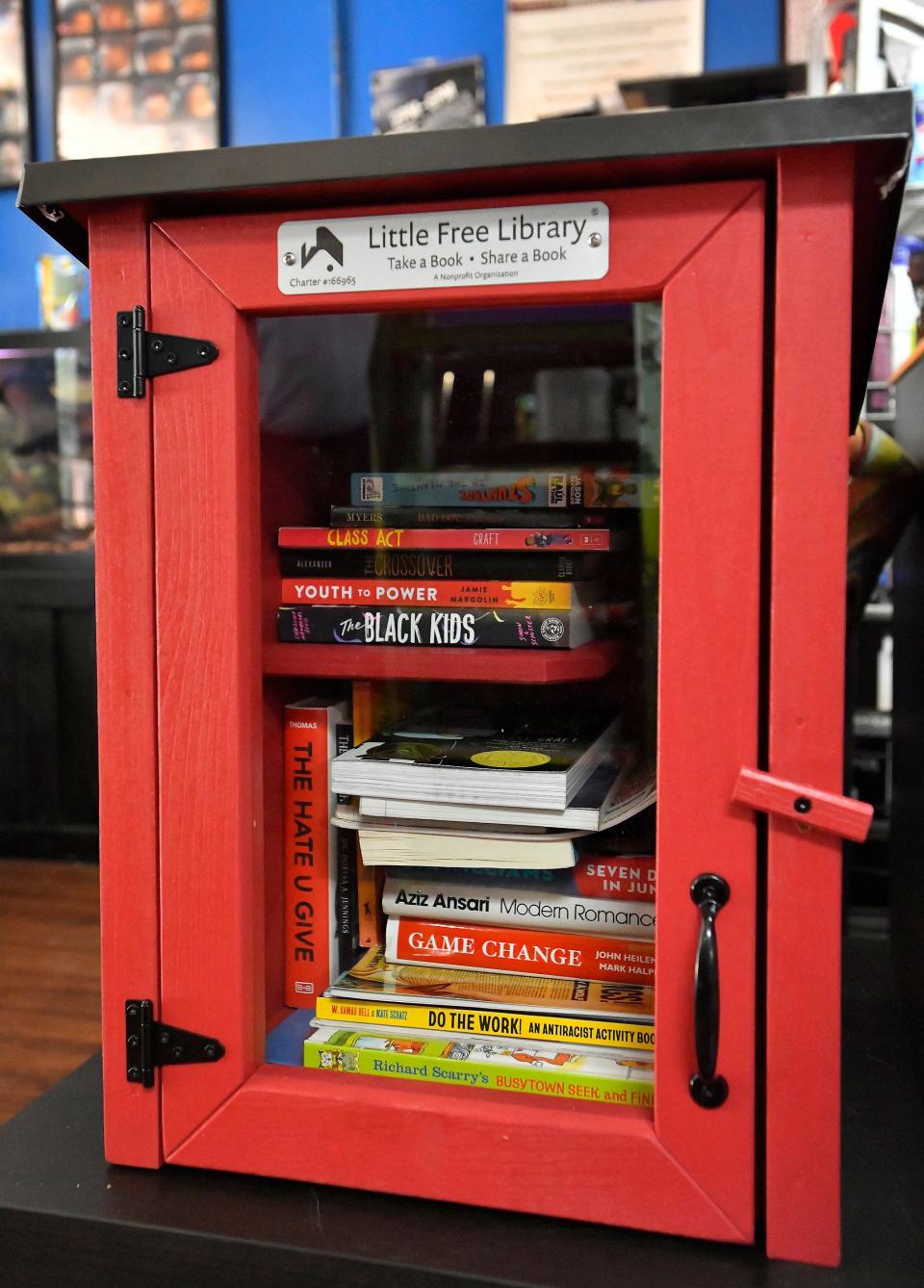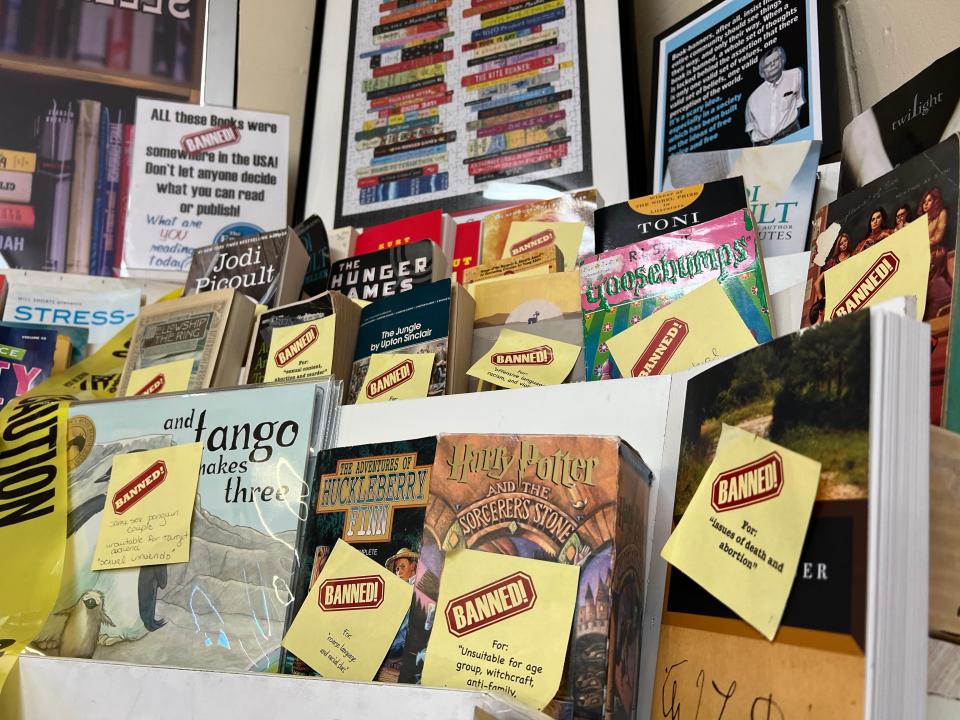That colorful free book box in your Jacksonville neighborhood may soon offer banned books
You may have seen one in your neighborhood, a cheerful little box with books in it. Some look like big birdhouses. Some resemble fantasy homes, or ramshackle huts, or even the house they're in front of. All of them offer free books to anyone who wants to read.
And now, in Duval County, some of the Little Free Libraries will be offering banned books.
In response to the recent surges in book bans in Duval County, Florida and across the U.S., the Little Free Library, a nonprofit dedicated to expanding book access through a global network of free book exchange boxes, has partnered with San Francisco-based ad agency Venables Bell + Partners to launch The Unbanned Book Club.
"An unprecedented number of books have been banned and challenged in America in recent years, silencing authors with diverse viewpoints and eliminating the chance for readers to feel seen and represented in their stories," said Greig Metzger, Executive Director of Little Free Library. "At our core as an organization, we are book lovers who believe deeply in the power of books to share unique ideas and perspectives and ultimately enhance our human experience, understanding, and appreciation for one another."
"When they ban books in schools," the LittleFreeLibrary.org site says, "we un-ban them in the community."
Free banned books: ‘Unbanned Book Club’ puts controversial kids’ volumes in Jacksonville readers’ hands
How does The Unbanned Book Club work?

In the program, new, specially branded Little Free Libraries will be placed around the Jacksonville area, filled with banned books provided by HarperCollins and Penguin Random House.
But it's not limited to those sites. While most Little Free Libraries may contain the usual collection of used romance, mysteries and thrillers, some people who own and maintain Little Free Libraries (called stewards) have been getting around local book bans for years by providing banned books. An additional 200 custom kits with banned books and promotional material will be available for interested stewards.
A selection of banned and challenged books will also be available for sale at unbannedbookclub.booksio.com with 15% of the proceeds benefitting the Little Free Library organization.
What are Little Free Libraries?
According to LittleFreeLibrary.org, a Little Free Library is "a 'take a book, share a book' free book exchange."
They can be anything from a box of books outside with a "Free" sign on it, up to stylized architectural masterpieces resembling little school buses, barns, snails, cathedrals, open books, ferries, birdhouses and castles. But the most common version is a wooden box of books with a door. Anyone is welcome to take a book or leave one to share with others.
"There is an understanding that real people are sharing their favorite books with their community," the site says, "little libraries have been called 'mini-town squares.'"
How did Little Free Libraries get started?
In 2009, Todd H. Bol put a model of a one-room schoolhouse full of books on a post in his front yard in Hudson, Wisconsin, as a tribute to his mother, who was a teacher. He got such a positive response he started making more and giving them away,
Two years later the Little Free Library was growing fast and starting to get national attention. There were over 4,000 libraries by the end of 2012, the same year it became a registered 501(c)(3) non-profit organization.
In 2022, there were 150,000 registered Libraries in more than 115 countries worldwide.
About Todd Bol: Man who started the Little Free Library movement, dies at 62
How can I find Little Free Libraries participating in The Unbanned Book Club?
Download the free Little Free Libraries app (iOS | Android) and tap Search. You can enter your location, a distance range, and then tap the special indicators for different options that says Banned Books. You'll get a list of locations that are either participating in the program or whose stewards regularly add their own banned books to their mix.
Note that not all free neighborhood book stands are registered with Little Free Libraries and not all the registered ones are listed in the app. Also, since people can add books and take them, any Library may contain a banned book at any time.
Are there other Little Free Library programs?
The Impact Library Program provides books at no cost to communities with limited book access.
The Indigenous Library Program places Little Free Libraries on tribal lands to help fight illiteracy in indigenous communities.
Stewards who participate in the Read in Color program pledge to provide books that provide perspectives on racism and social justice, and celebrate people of color, LGBTQ+, and other marginalized voices.
'Everyone should see themselves': Little Free Library fights racism by diversifying its book-sharing boxes
'Decolonize your bookshelf': Little libraries, book boxes promote conversation about race in America
How can I make my own Little Free Library?
Anyone can start their own Little Free Library. You can build your own, put some books in it and stop there, or you can register it with Little Free Library to become part of their network. When you register, you get a charter sign with a unique number that allows you to set up your steward account and add it to the world map. Charter signs start at $39.95.
If you're not that handy, the Little Free Library offers a variety of finished and unfinished kits of several different styles and sizes starting from $179 to help you get started. You also can buy book bundles there to help you stock up.
How else can I find banned books in my area?

Books that have been banned (or challenged and temporarily removed or restricted) aren't that hard to find.
Many local bookstores sell books banned in school and public libraries. Some even set up special sections to feature them.
Online bookstores such as Amazon, Barnes and Noble are obvious but also consider using Bookshop.org, which supports independent local bookstores (or just ordering from local bookstores).
The Brooklyn Public Library offers free online library cards to anyone ages 13-21 anywhere in the U.S., allowing them access to their full ebook libraries and learning databases.
The Banned Book Club is a digital library that uses location tracking to let you download books for free that have been banned in your community.
Project Gutenberg, which offers free digital downloads of books that have passed into public domain, has a banned book list.
Google Books also has free downloadable ebooks of banned classics.
This article originally appeared on The Daytona Beach News-Journal: Little Free Libraries launch Unbanned Book Club for banned books reads

